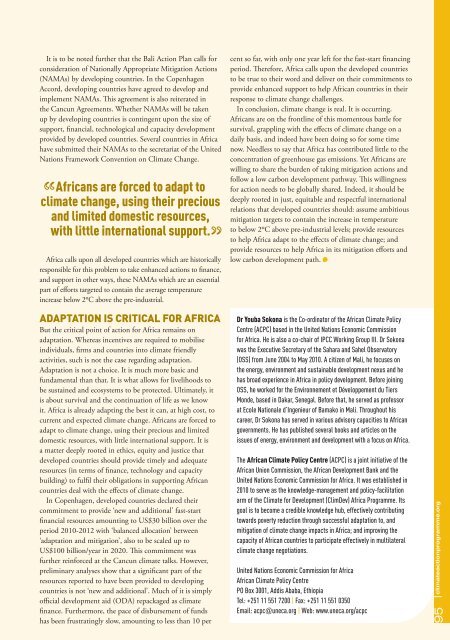Climate Action 2011-2012
You also want an ePaper? Increase the reach of your titles
YUMPU automatically turns print PDFs into web optimized ePapers that Google loves.
It is to be noted further that the Bali <strong>Action</strong> Plan calls for<br />
consideration of Nationally Appropriate Mitigation <strong>Action</strong>s<br />
(NAMAs) by developing countries. In the Copenhagen<br />
Accord, developing countries have agreed to develop and<br />
implement NAMAs. This agreement is also reiterated in<br />
the Cancun Agreements. Whether NAMAs will be taken<br />
up by developing countries is contingent upon the size of<br />
support, financial, technological and capacity development<br />
provided by developed countries. Several countries in Africa<br />
have submitted their NAMAs to the secretariat of the United<br />
Nations Framework Convention on <strong>Climate</strong> Change.<br />
Africans are forced to adapt to<br />
climate change, using their precious<br />
and limited domestic resources,<br />
with little international support.<br />
Africa calls upon all developed countries which are historically<br />
responsible for this problem to take enhanced actions to finance,<br />
and support in other ways, these NAMAs which are an essential<br />
part of efforts targeted to contain the average temperature<br />
increase below 2ºC above the pre-industrial.<br />
cent so far, with only one year left for the fast-start financing<br />
period. Therefore, Africa calls upon the developed countries<br />
to be true to their word and deliver on their commitments to<br />
provide enhanced support to help African countries in their<br />
response to climate change challenges.<br />
In conclusion, climate change is real. It is occurring.<br />
Africans are on the frontline of this momentous battle for<br />
survival, grappling with the effects of climate change on a<br />
daily basis, and indeed have been doing so for some time<br />
now. Needless to say that Africa has contributed little to the<br />
concentration of greenhouse gas emissions. Yet Africans are<br />
willing to share the burden of taking mitigation actions and<br />
follow a low carbon development pathway. This willingness<br />
for action needs to be globally shared. Indeed, it should be<br />
deeply rooted in just, equitable and respectful international<br />
relations that developed countries should: assume ambitious<br />
mitigation targets to contain the increase in temperature<br />
to below 2ºC above pre-industrial levels; provide resources<br />
to help Africa adapt to the effects of climate change; and<br />
provide resources to help Africa in its mitigation efforts and<br />
low carbon development path.<br />
adaptation iS critical For aFrica<br />
But the critical point of action for Africa remains on<br />
adaptation. Whereas incentives are required to mobilise<br />
individuals, firms and countries into climate friendly<br />
activities, such is not the case regarding adaptation.<br />
Adaptation is not a choice. It is much more basic and<br />
fundamental than that. It is what allows for livelihoods to<br />
be sustained and ecosystems to be protected. Ultimately, it<br />
is about survival and the continuation of life as we know<br />
it. Africa is already adapting the best it can, at high cost, to<br />
current and expected climate change. Africans are forced to<br />
adapt to climate change, using their precious and limited<br />
domestic resources, with little international support. It is<br />
a matter deeply rooted in ethics, equity and justice that<br />
developed countries should provide timely and adequate<br />
resources (in terms of finance, technology and capacity<br />
building) to fulfil their obligations in supporting African<br />
countries deal with the effects of climate change.<br />
In Copenhagen, developed countries declared their<br />
commitment to provide ‘new and additional’ fast-start<br />
financial resources amounting to US$30 billion over the<br />
period 2010-<strong>2012</strong> with ‘balanced allocation’ between<br />
‘adaptation and mitigation’, also to be scaled up to<br />
US$100 billion/year in 2020. This commitment was<br />
further reinforced at the Cancun climate talks. However,<br />
preliminary analyses show that a significant part of the<br />
resources reported to have been provided to developing<br />
countries is not ‘new and additional’. Much of it is simply<br />
official development aid (ODA) repackaged as climate<br />
finance. Furthermore, the pace of disbursement of funds<br />
has been frustratingly slow, amounting to less than 10 per<br />
Dr Youba Sokona is the Co-ordinator of the African <strong>Climate</strong> Policy<br />
Centre (ACPC) based in the United Nations Economic Commission<br />
for Africa. He is also a co-chair of IPCC Working Group III. Dr Sokona<br />
was the Executive Secretary of the Sahara and Sahel Observatory<br />
(OSS) from June 2004 to May 2010. A citizen of Mali, he focuses on<br />
the energy, environment and sustainable development nexus and he<br />
has broad experience in Africa in policy development. Before joining<br />
OSS, he worked for the Environnement et Développement du Tiers<br />
Monde, based in Dakar, Senegal. Before that, he served as professor<br />
at Ecole Nationale d’Ingenieur of Bamako in Mali. Throughout his<br />
career, Dr Sokona has served in various advisory capacities to African<br />
governments. He has published several books and articles on the<br />
issues of energy, environment and development with a focus on Africa.<br />
The African <strong>Climate</strong> Policy Centre (ACPC) is a joint initiative of the<br />
African Union Commission, the African Development Bank and the<br />
United Nations Economic Commission for Africa. It was established in<br />
2010 to serve as the knowledge-management and policy-facilitation<br />
arm of the <strong>Climate</strong> for Development (ClimDev) Africa Programme. Its<br />
goal is to become a credible knowledge hub, effectively contributing<br />
towards poverty reduction through successful adaptation to, and<br />
mitigation of climate change impacts in Africa; and improving the<br />
capacity of African countries to participate effectively in multilateral<br />
climate change negotiations.<br />
United Nations Economic Commission for Africa<br />
African <strong>Climate</strong> Policy Centre<br />
PO Box 3001, Addis Ababa, Ethiopia<br />
Tel: +251 11 551 7200 | Fax: +251 11 551 0350<br />
Email: acpc@uneca.org | Web: www.uneca.org/acpc<br />
95 climateactionprogramme.org












